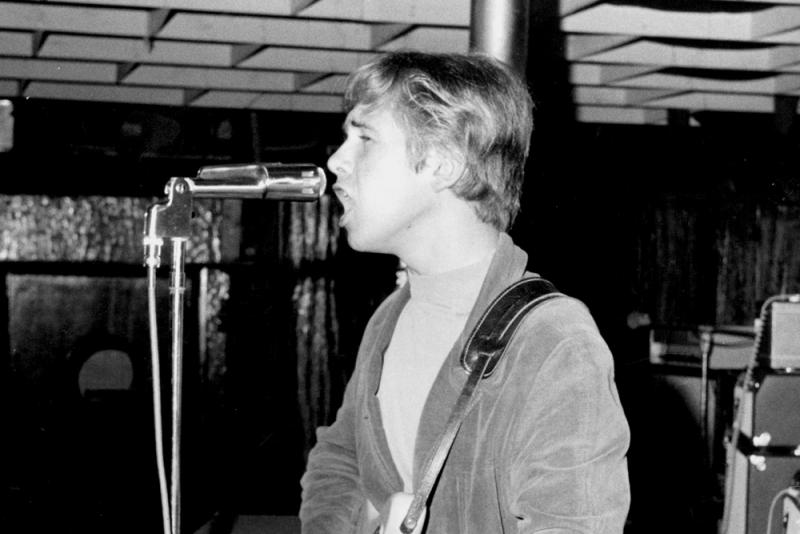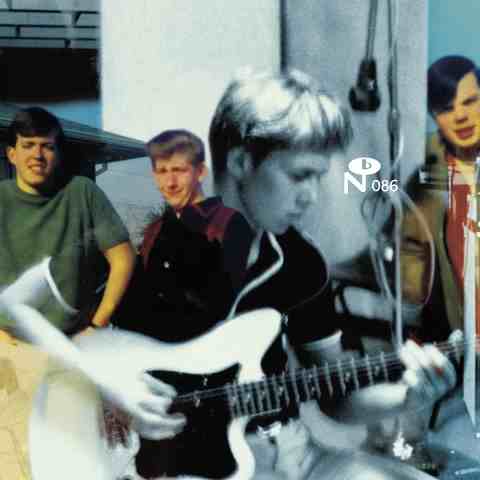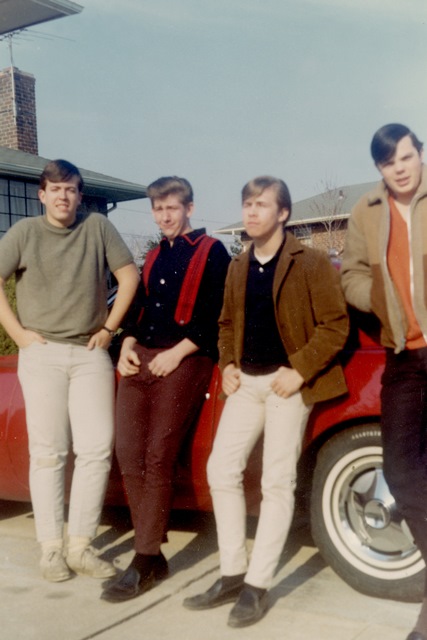Music Reissues Weekly: The Mystic Tide - Frustration | reviews, news & interviews
Music Reissues Weekly: The Mystic Tide - Frustration
Music Reissues Weekly: The Mystic Tide - Frustration
Sixties psychedelic punks from Long Island whose sonic assault still resonates

Crashing chords are followed by a spindly, untrammelled solo guitar. After this subsides, the singer lays out the issue: “I try, I cry, I just can't see why. It's clear, she's near, the sights and sounds I hear.” He’s distressed, his anguish palpable, All the while, slabs of guitar squall get ever-more edgy, increasingly wigged out. There are more solos which aren’t far from those of The Velvet Underground’s “I Heard Her Call my Name.”
This monumental recording is “Frustration,” the top side of a self-issued March 1967 single by Long Island garage band The Mystic Tide. Aesthetically, it wasn’t a one-off. Though an instrumental, its pummelling B-side “Psychedelic Journey (Part 1”) is as intense. The follow-up single – “Running Through The Night” / “Psychedelic Journey (Part 2)” (April 1967) – is cut from the same manic cloth. The band’s final seven-inch – Mystery Ship” / “You Won't Look Back” (August 1967) – is slightly less extreme, but just as noteworthy. Each of these records barely sold.
 A Velvet Underground comparison is reasonable, but “I Heard Her Call my Name” was first heard on record in January 1968 when White Light/White Heat, the album it features on, was released. The Mystic Tide were doing their own thing before Lou Reed and the gang became similarly frazzled.
A Velvet Underground comparison is reasonable, but “I Heard Her Call my Name” was first heard on record in January 1968 when White Light/White Heat, the album it features on, was released. The Mystic Tide were doing their own thing before Lou Reed and the gang became similarly frazzled.
Frustration is a new album collecting everything the Mystic Tide issued. There were five singles overall. “Stay Away” / “Why” (October 1966) and “Mystic Eyes” / “I Search For a New Love” (December 1966) preceded “Frustration” and the ensuing pair of 45s. There was also a 1965 recording titled “I Wouldn’t Care,” a further track included on the smartly presented and properly annotated Frustration. The thoughtful insert essay is by genre expert Alec Palao, who has also mastered what’s heard. This is a significant aural upgrade on previous Mystic Tide packages.
The Mystic Tide were Joe Docko (lead guitar, vocals), Paul Picell (bass), Jim Thomas (rhythm guitar – he left before the final single) and John William (drums). The band formed in early 1965 as The Chosen Few. Bandleader Docko was their songwriter and behind what they sounded like. They were based two hours east of New York City in the town of Woodbury. The name change to The Mystic Tide came in late 1965 and was inspired by “Mystic Eyes,” the most extreme single by Van Morrison’s Them. Contrary to what might be expected, The Mystic Tide’s own song cheekily titled “Mystic Eyes” was a moody, vaguely Zombies-esque folk-punker rather than the rave-up the band name and title would suggest.
 Before “Frustration,” the first two singles have none of the wired aggression running through what came next. Something happened to this band between singles number two and number three. According to interviews with the late Joe Docko, he had seen The Magicians and The Blues Magoos in New York. Some of the wildest elements of the latter may have bled into The Mystic Tide. He was also a fan of The Butterfield Blues Band’s August 1966 East-West album. Furthermore, there are hints of The Yardbirds’ version of “I’m a Man.” (Pictured left, The Mystic Tide. From left: John William, Jim Thomas, Joe Docko, Paul Picell)
Before “Frustration,” the first two singles have none of the wired aggression running through what came next. Something happened to this band between singles number two and number three. According to interviews with the late Joe Docko, he had seen The Magicians and The Blues Magoos in New York. Some of the wildest elements of the latter may have bled into The Mystic Tide. He was also a fan of The Butterfield Blues Band’s August 1966 East-West album. Furthermore, there are hints of The Yardbirds’ version of “I’m a Man.” (Pictured left, The Mystic Tide. From left: John William, Jim Thomas, Joe Docko, Paul Picell)
But none of this directly explains where The Mystic Tide were coming from. Their form of sonic attack stands on its own. While it is garage-psychedelia, this particular wildness is attitudinally concomitant with the most tempestuous records generated by Texas’ garage punks (e.g. The Remaining Few’s “Painted Air” or The Stereo Shoestring’s “On the Road South”). And The Mystic Tide certainly had nothing to do with the locally popular soul-rock of fellow Long Island bands like The (Young) Rascals, The Pigeons (who became Vanilla Fudge) and The Vagrants. The Mystic Tide were an anomaly.
It was fitting then that this forgotten, uncompromising band first resurfaced on the 1979 compilation album Ear Piercing Punk, a supposed assemblage of contemporaneous punk bands which actually collected rough-and-tough Sixties tracks. “Running Through the Night” was the chosen cut, and it certainly has the anger and energy of Seventies punk. Also in 1979, “Frustration” re-emerged on the seismic Acid Dreams album. The Mystic Tide next cropped up in 1982 when “Psychedelic Journey (Part 1)” was included on the UK compilation Endless Journey Phase One. The word was out. From this point on, it was obvious The Mystic Tide were remarkable. Some of their single tracks formed one side of a French album in 1983. Then, in 1991, David Brown’s Distortions label released the first full-album, proper-overview of The Mystic Tide.
Now, The Mystic Tide have returned. Get Frustration and be knocked for six.
- Next week: Lightning And Thunder! – reggae auteur Niney The Observer’s early productions are compiled
- More reissue reviews on theartsdesk
- Kieron Tyler’s website
Explore topics
Share this article
The future of Arts Journalism
You can stop theartsdesk.com closing!
We urgently need financing to survive. Our fundraising drive has thus far raised £49,000 but we need to reach £100,000 or we will be forced to close. Please contribute here: https://gofund.me/c3f6033d
And if you can forward this information to anyone who might assist, we’d be grateful.

Subscribe to theartsdesk.com
Thank you for continuing to read our work on theartsdesk.com. For unlimited access to every article in its entirety, including our archive of more than 15,000 pieces, we're asking for £5 per month or £40 per year. We feel it's a very good deal, and hope you do too.
To take a subscription now simply click here.
And if you're looking for that extra gift for a friend or family member, why not treat them to a theartsdesk.com gift subscription?
more New music
 Doja Cat's 'Vie' starts well but soon tails off
While it contains a few goodies, much of the US star's latest album lacks oomph
Doja Cat's 'Vie' starts well but soon tails off
While it contains a few goodies, much of the US star's latest album lacks oomph
 Mariah Carey is still 'Here for It All' after an eight-year break
Schmaltz aplenty but also stunning musicianship from the enduring diva
Mariah Carey is still 'Here for It All' after an eight-year break
Schmaltz aplenty but also stunning musicianship from the enduring diva
 Album: Solar Eyes - Live Freaky! Die Freaky!
Psychedelic indie dance music with a twinkle in its eye
Album: Solar Eyes - Live Freaky! Die Freaky!
Psychedelic indie dance music with a twinkle in its eye
 Album: Night Tapes - portals//polarities
Estonian-voiced, London-based electro-popsters' debut album marks them as one to watch for
Album: Night Tapes - portals//polarities
Estonian-voiced, London-based electro-popsters' debut album marks them as one to watch for
 Album: Mulatu Astatke - Mulatu Plays Mulatu
An album full of life, coinciding with a 'farewell tour'
Album: Mulatu Astatke - Mulatu Plays Mulatu
An album full of life, coinciding with a 'farewell tour'
 Music Reissues Weekly: Sly and the Family Stone - The First Family: Live At Winchester Cathedral 1967
Must-have, first-ever release of the earliest document of the legendary soul outfit
Music Reissues Weekly: Sly and the Family Stone - The First Family: Live At Winchester Cathedral 1967
Must-have, first-ever release of the earliest document of the legendary soul outfit
 Album: Robert Plant - Saving Grace
Mellow delight from former Zep lead
Album: Robert Plant - Saving Grace
Mellow delight from former Zep lead
 Brìghde Chaimbeul, Round Chapel review - enchantment in East London
Inscrutable purveyor of experimental Celtic music summons creepiness and intensity
Brìghde Chaimbeul, Round Chapel review - enchantment in East London
Inscrutable purveyor of experimental Celtic music summons creepiness and intensity
 First Person: Musician ALA.NI on how thoughts of empire and reparation influenced a song
She usually sings about affairs of the heart - 'TIEF' is different, explains the star
First Person: Musician ALA.NI on how thoughts of empire and reparation influenced a song
She usually sings about affairs of the heart - 'TIEF' is different, explains the star
 Album: NewDad - Altar
The hard-gigging trio yearns for old Ireland – and blasts music biz exploitation
Album: NewDad - Altar
The hard-gigging trio yearns for old Ireland – and blasts music biz exploitation
 Album: The Divine Comedy - Rainy Sunday Afternoon
Neil Hannon takes stock, and the result will certainly keep his existing crowd happy
Album: The Divine Comedy - Rainy Sunday Afternoon
Neil Hannon takes stock, and the result will certainly keep his existing crowd happy
 Music Reissues Weekly: Robyn - Robyn 20th-Anniversary Edition
Landmark Swedish pop album hits shops one more time
Music Reissues Weekly: Robyn - Robyn 20th-Anniversary Edition
Landmark Swedish pop album hits shops one more time

Add comment